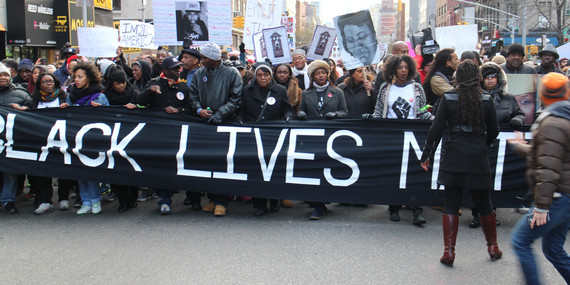The Black Lives Matter movement, which seeks to prevent the untimely deaths of people of color, has an indisputably noble goal, but do police officers really pose the most serious threat to the lives of African Americans, as we have been led to believe?
While statistics on police shootings do reveal that young black men are disproportionately the victims of police shootings, crimes simply do not breakdown on proportionate demographic lines. Blacks constitute only 13 percent of the population, but they represent a majority of the homicide and robbery arrests. Over the past decade, 40 percent of those arrested for killing police officers have also been black.
Some argue that a disproportionate number of black arrests does not mean that African Americans commit more crime, but is merely a result of living in heavily policed neighborhoods. While this argument has some merit, studies based on anonymously self-reported crime data also find that blacks are disproportionately involved in violent crimes.
Given these disturbing disparities, it is unfortunate, but not entirely unreasonable, that African Americans experience a higher likelihood of being killed in a police shooting than a white person.
If the mere disproportionate representation of blacks as victims of police shootings is indicative of organized racism, why aren't we accusing the police of sexism since the overwhelming majority of those arrested and killed by police are men?
Undoubtedly there are individual racist officers, like the San Francisco police officer who sent text messages referencing African Americans as "wild animals".
Discrimination against blacks, such as being pulled over more often for traffic stops, does exist, but it is usually a result of unconscious bias by well meaning officers. As FBI director James Comey pointed out, "The two young black men on one side of the street look like so many others the officer has locked-up. Two white men on the other side of the street--even in the same clothes--do not. And that drives different behavior. The officer turns toward one side of the street and not the other."
Police shootings are undoubtedly a serious problem in the US. According to The Guardian, "In the first 24 days of 2015, police in the US fatally shot more people than police did in England and Wales, combined, over the past 24 years." Although, The Guardian "forgot" to take the population difference into consideration, even adjusted for population, the US police kill more people than other democracies.
What is almost just as troubling as the shootings themselves is that the officers involved even in the most questionable shootings almost always go unpunished.
In 2014, a SWAT team that maimed an infant by throwing a flash grenade into an infant's crib in a drug raid gone wrong did not face any criminal charges. In 2011, Officers Jay Cicinelli and Joseph Wolfe of the Fullerton police department beat a white homeless man to death under the pretext of arresting him. A jury acquitted both of them. Based on what we know so far, the shooting of Philando Castile is beyond senseless.
Striving to hold these rogue officers accountable is laudable. But to suggest that every police shooting of a man of color is racist is a great disservice to white victims of police shootings, African Americans and law enforcement officers.
Heather MacDonald, a conservative scholar, points out that 12 percent of white and Hispanic homicide deaths are due to police officers, while only four percent of black homicide deaths are the result of police officers. The lower proportion of black deaths due to police shootings is because most blacks are killed by fellow citizens, overwhelmingly black, and not police officers.
Blacks are six times more likely to be victims of homicides. To make a serious dent in the mortality rate of young African Americans, we have to answer some very tough questions: Why are blacks so over represented in violent crime, both as offenders and victims? What can we do to address the some of the most serious issues facing the black community, such as poverty, low school graduation rate and single parent homes.
The Baltimore Sun reported, "Blood was shed in Baltimore at an unprecedented pace in 2015, with mostly young, black men shot to death in a near-daily crush of violence." How many of these lives could have been saved had we looked beyond the idea of homicidal racist cops out to kill young African Americans?
Authored by Ash Murthy, with inputs from Michael Fisher, Senior Police Officer at Orange City Police Department, California.
